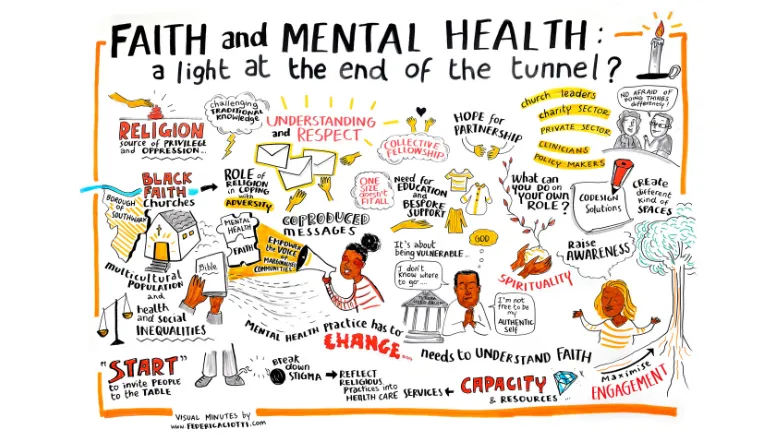“This project highlights the need to build partnerships between mental health support and spirituality, and the importance of involving Black faith communities to develop culturally appropriate policies and practices in local mental healthcare.”
PhD student Sanchika Campbell
26 April 2023
PRiSM project explores religion, spirituality and mental health in Southeast London faith communities
The Perspectives on Religion and Spirituality in coping with Mental health (PRiSM) project, aims to understand the role of religion and spirituality in handling hardship and their relationship to mental health among members of Black Majority Churches (BMCs) in South-East London.

Although much of the world's population participates in religious or spiritual practice, religion has often been neglected in mainstream psychology and mental health research.
The study involved community members of Black Majority Churches in Southeast London as co-researchers and included interviews with 18 people from two local churches, as well as an analysis of survey data from the South-East London Community Health study (SELCoH).
PhD student Sanchika Campbell focusses on this topic in her thesis, ‘PRiSM - Perspectives on Religion and Spirituality in coping with Mental health’. This study sits in the Marginalised Communities research programme within the ESRC Centre for Society & Mental Health (CSMH) at King’s College London.
The findings showed that for many of the participants, faith and spirituality play an important role in helping face challenges. The SELCoH study found that attending religious services and spiritual coping (praying) were common amongst Black African and Caribbean groups. Analyses also found that attending services frequently were linked to a 45% lower risk of reporting mental health disorders, when compared to less frequent or no religious attendance, but more frequent service attendance was also associated with almost half the odds of asking for help if they reported mental ill health. This means that whilst people attending services often were reporting mental health issues less, they also were less likely to ask for help from mental health services in dealing with such issues.
“I hope the PRiSM project will help improve our understanding, respect and action around faith and mental health, as we are increasingly recognising religion as an important factor of health. From this project we have created insights for healthcare providers on how they could consider and respect religious beliefs in healthcare services, and for Black Majority Churches and faith communities to better support their members’ mental health.”
The project’s insights for local healthcare providers recommended challenging racist assumptions, engaging with Black community networks, breaking cycles of reinforcing inequalities and to consider how spirituality can form part of interventions.
For faith communities, the project’s findings suggested people meet to speak about mental health with love, empathy and acceptance, encourages faith leaders to show vulnerability and transparency about their own struggles, and to work with clinically trained mental health professionals for mental health awareness.
“The purpose of the project contains a subject matter that has been of great concern to me throughout my ministry as an Evangelist. Have we, faith and religious leaders, succeeded in meeting the mental health needs or are we providing adequate mental health support to those of our members in need of such support through our worship, spiritual or evangelical outreach programs? Thanks to The PRiSM project, I am now better equipped to assist members of my congregation in coping with adversity such as anxiety, depression.”
Winston Webber, Evangelist
This project was led by Sanchika Campbell, co-researched by Winston Webber, Denise Richards and Rev. Gail Thompson, supervised by Professor Stephani Hatch and Dr Charlotte Woodhead and contributed to by Nathan Stanley, Dr Chanelle Myrie, Anna-Theresa Jieman and Dr Juliana Onwumere. The PhD is funded by the Economic and Social Research Council (ESRC), as part of the London Interdisciplinary Social Science Doctoral Training Partnership (LISS-DTP) and ESRC Centre for Society & Mental Health.


